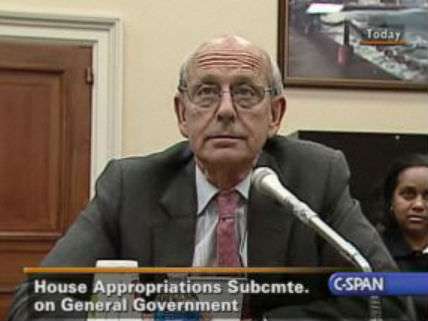When Should the Supreme Court Overturn One of Its Own Precedents?
SCOTUS weighs stare decisis in Friedrichs v. California Teachers Association.
Black's Law Dictionary defines stare decisis as "the doctrine of precedent, under which it is necessary for a court to follow earlier judicial decisions when the same points arise again in litigation." The phrase is Latin, and it means "to stand by things decided."
The doctrine of stare decisis was at the heart of Monday's oral arguments in Friedrichs v. California Teachers Association. At issue was whether the Supreme Court should overrule its 1977 precedent Abood v. Detroit Board of Education, a case in which public-school teachers were required to pay mandatory union fees, as a condition of government employment, even though the teachers were not union members.
"You come here, of course, with a heavy burden," Justice Elena Kagan told Michael Carvin, the lawyer representing Rebecca Friedrichs and the other California teachers challenging the state's mandatory union fee scheme on First Amendment grounds. "That's always true in cases where somebody asks us to overrule a decision." Kagan left little doubt that she would leave Abood firmly in place.

Justice Stephen Breyer raised a similar objection to the teachers' case. "What about the Eighth Amendment?" he asked Carvin. "There's an individual right, some think, perhaps, against capital punishment. The Court has consistently ruled against it. So I guess if that's ever considered again, under your view, the Court would give no weight to stare decisis."
But Carvin didn't flinch. "If the Court was convinced that capital punishment was clearly outlawed by the Constitution," he told Breyer, "I think it would be very strange to tell people who were being executed in the future that even though this is an unconstitutional execution, we are bound by our erroneous prior decisions."
That's exactly right. And Breyer knows it. After all, Breyer has his own record of voting to overturn precedents that he believes to be wrong. In 2003, for example, Breyer joined Justice Anthony Kennedy's majority opinion in Lawrence v. Texas, the gay rights decision that overturned Bowers v. Hardwick, the 1986 precedent that affirmed the power of state governments to prohibit homosexual conduct. Bowers "was not correct when it was decided," Kennedy declared, "and it is not correct today."
To be sure, stare decisis is a venerable doctrine in American law. But it is not the only venerable doctrine. As Justice Clarence Thomas once observed, "stare decisis is only an 'adjunct' of our duty as judges to decide by our best lights what the Constitution means." Put differently, in a clash between legal precedent and constitutional text, shouldn't judges put the Constitution first?
